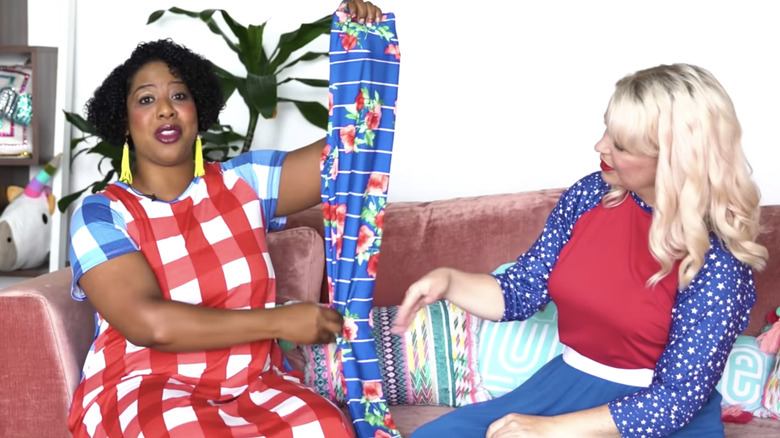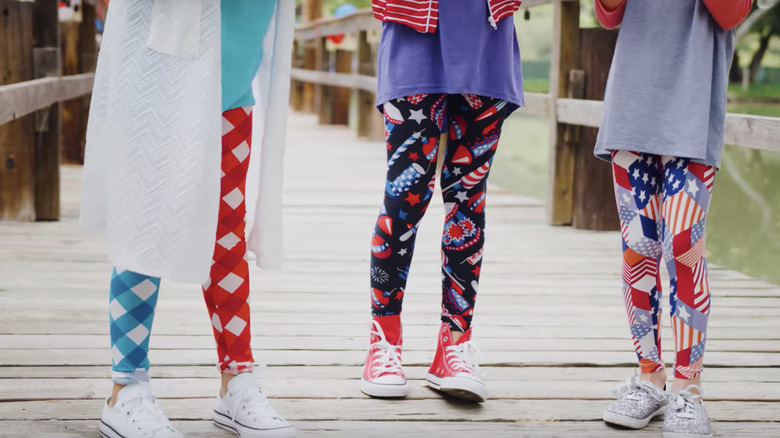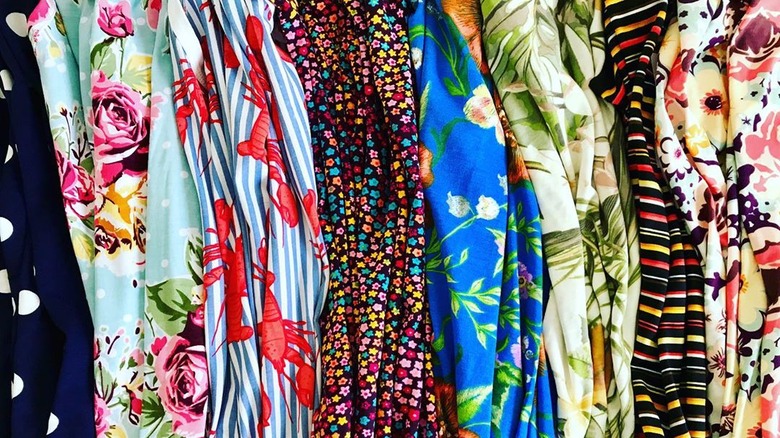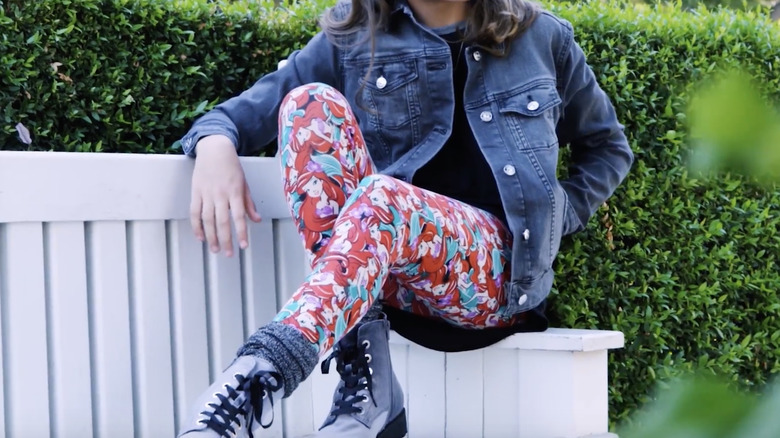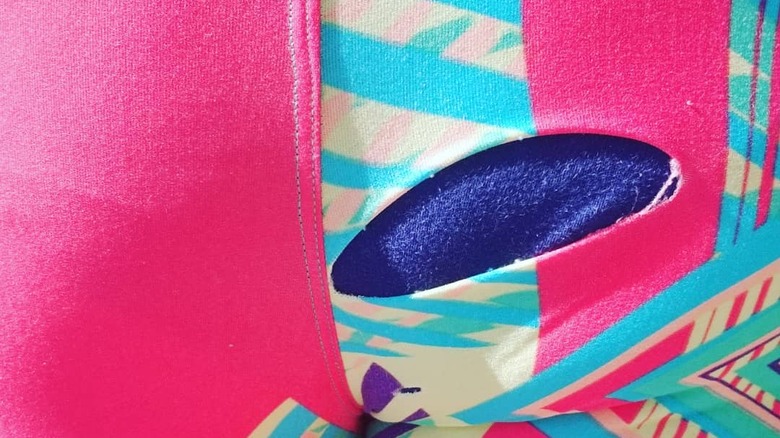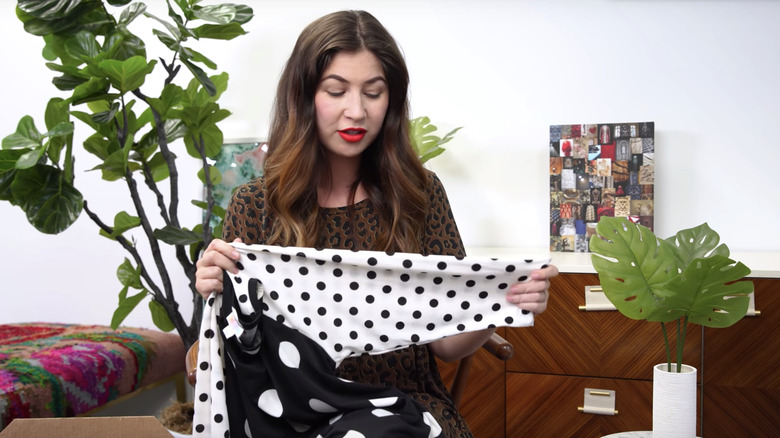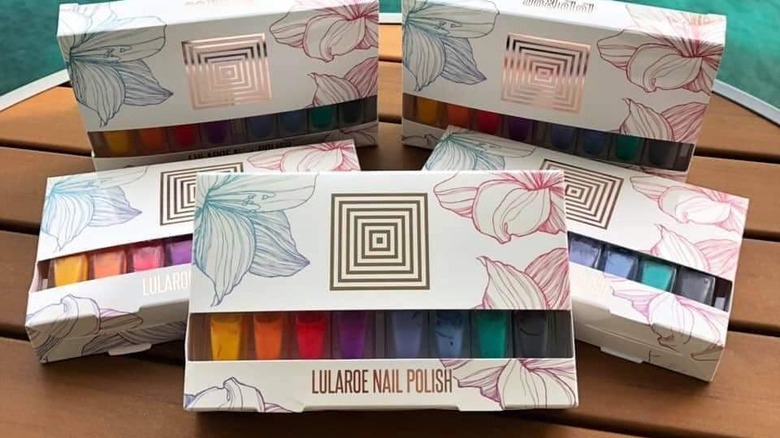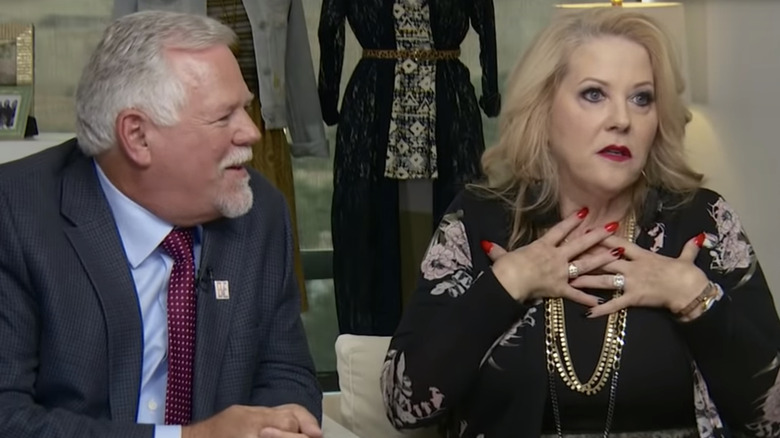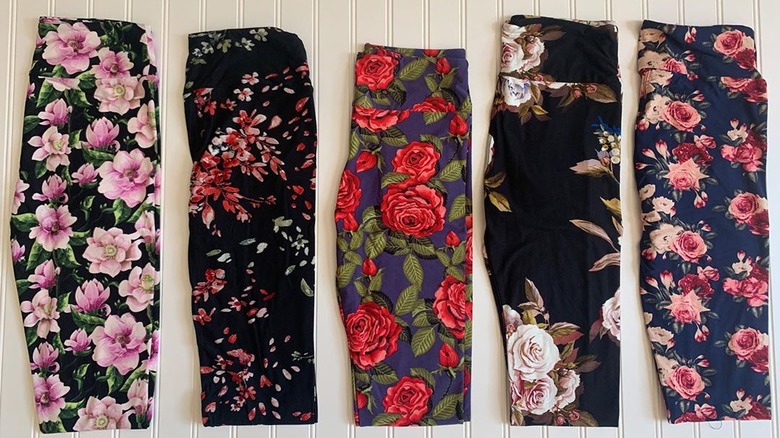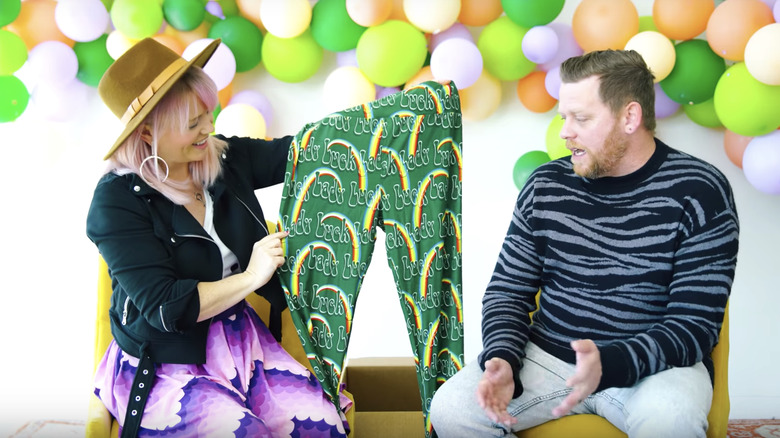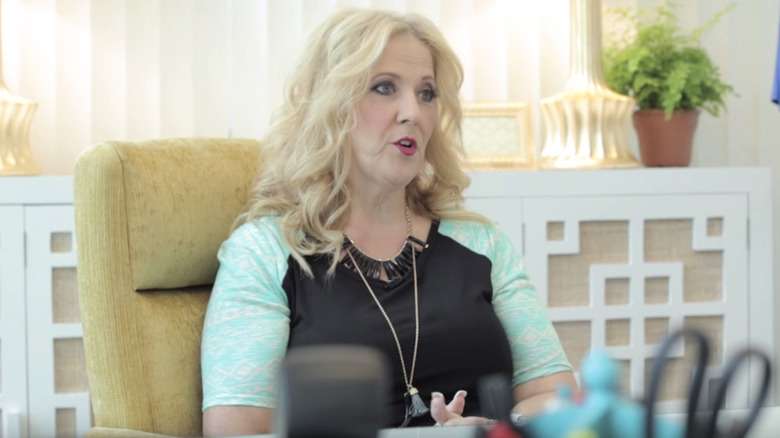LuLaRoe: The Real Reason Why Women Are Quitting
If you join the LuLaRoe team, it's said you'll be able to work from home, set your own schedule, and join an entire team of enthusiastic and independent fashion retailers — plus get discounts, sales tips, and leadership training. And most importantly, you're said to make money. All this according to the Join LuLaRoe section of their website. And within as little as two weeks, you can begin your new career, free from the constraints of the 9-to-5 grind. Sounds exciting, right?
But as the old adage goes, if it sounds like it's too good to be true, then it's probably, well, too good to be true. According to several accounts from consultants, being a rep for LuLaRoe isn't quite as incredible as the company would have you believe. In fact, some of the details that have emerged are downright horrifying if they are indeed true, ranging from strange smells coming from boxes of inventory to sellers being stuck with thousands of dollars of unsold garments.
So what's really going on here? Can you actually make a living with LuLaRoe or is it a pyramid scheme, as some have suggested? And what's this about spies? Here are the real reason women are quitting LuLaRoe.
It's a lot to pay up front
Before you can get started selling for LuLaRoe, of course, you have to have inventory, which makes sense. But inventory isn't free for consultants, and sellers don't have the option of borrowing some before paying the company back after they start making sales. According to the Join LuLaRoe section of their website, you have to invest a minimum of $2,500 up front in order to secure your first shipment of clothing, which you can then turn around and sell at a markup.
When you think about it as a business investment, $2,500 isn't that much. But for many consultants, who are often women like mothers and military wives, that's a big chunk of change. And according to an article in Racked, the average price for a consultant's first shipment of inventory is $5,000 — double the amount. There's also sales incentives for those who sponsor consultants (in order to become a seller, you need an existing consultant to sponsor you), as the more money a consultant puts down initially, the bigger bonus her sponsor reportedly receives.
Translation: it's not cheap to join the LuLaRoe team. And that can be a deterrent to ever joining.
The competition is stiff
As company co-founder DeAnne Stidham tells it, the origin story of LuLaRoe is a humble one, according to Bloomberg Businessweek. In 2012, she sewed a skirt for her daughter, and so many of her friends admired it that they started placing orders. In mere days, Stidham had hundreds of orders, and, thus, with the help of her husband Mark, a business was born.
Fast-forward to 2016. Buzz about the company was spreading via word of mouth and Facebook groups, which intrigued women like Roberta Blevins. In March of that year, she paid $9,000 to become a LuLaRoe consultant. At the time, there were only a few thousand consultants out there, and Blevins said she had no trouble making money. Within four months, she rose from consultant to trainer, the next level of the pyramid.
But then the company blew up, and the market became overly saturated with hundreds of thousands of consultants trying to sell clothing. By April of 2017, LuLaRoe announced they would buy back inventory, and many lower-level consultants decided to cut their losses and run. It seems there was just too much competition out there for so many consultants to be profitable.
MLM or pyramid scheme?
LuLaRoe was officially founded by DeAnne and Mark Stidham in 2013 as a multi-level marketing company, or an MLM, according to Bloomberg Businessweek. Ideally, to be successful as a seller in an MLM, you sell a certain amount of products to individuals, who, in turn, sell those products to other individuals. The more individuals who work under you, the more inventory you distribute, ergo the more money you make. As long as there's continued demand for the product, a seller can be successful.
Additionally, while an MLM can legally give bonuses to consultants who enlist new sellers, the bonuses can't be based on how much product those new recruits purchase. That stops too much inventory from being flooded down the line of distributors and winding up sitting in people's spare bedrooms.
But, as it turns out, during LuLaRoe's first four years, that's allegedly what it was doing. Consultants would make more money if their new recruit spent more money, regardless of whether or not they could turn around and sell that inventory. That sounds awfully a lot like a pyramid scheme, and a big reason sellers ran screaming for the hills when word got out that was happening.
LuLaRoe allegedly dictates what inventory you get
According to the Join LuLaRoe section of their company website, the first step in becoming a LuLaRoe consultant is to "choose your inventory." It goes on to say that you can select pieces from their exciting offerings, with the option of getting access to new items as they are launched. So ideally, when your order arrives, it will be filled with clothing that you've hand-picked and can sell to others.
But as LuLaRoe consultant Christina Hinks tells it, that's not what happened when she decided to join the LuLaRoe family to the tune of a $4,900 down payment. "I googled around and saw these hedgehog and bear leggings — so cute," she recalled in an interview with Racked. But when her shipment arrived two months later, it was reportedly not what she had in mind. "I live just outside of Chicago. My first shipment included 270 pieces of Southwest-inspired prints," she shared. That's not exactly in tune with the region.
Hinks wound up selling her shipment to another consultant who lived where those patterns would have a better chance of selling. Um, why would you want to work for a company if you can't pick what you sell?
The products had problems
As word got around about LuLaRoe's clothing — particularly their leggings — in the earlier part of the company's history, customers seemed satisfied with them. In some circles, they were even called "butter leggings," as they developed a reputation for being extremely soft and warm, yet just thick enough to keep customers warm. It's no wonder then that more and more people were interested in having a pair... or ten.
But in early 2017, LuLaRoe leggings became known for something else: ripping. "These pants rip like wet toilet paper," customer Valerie Williams told Business Insider. She reportedly ordered five pairs of leggings, and she claimed two of them ripped right after she put them on. "This must be a widespread issue," she stated. Indeed it was, as a lot buyers reported the same thing, and LuLaRoe responded by setting up a huge refund program. It'd appear the company had literally gotten too big for its britches too fast, and it was showing in the quality of the products.
That's not all, either. Apparently some consultants reported a foul stench emanating from their unworn, brand-new LuLaRoe inventory. That's just wild.
Some sellers filed for bankruptcy
Making the decision to have children is a big one for a variety of reasons — not least among them is the cost. That's why when consultant Marlie Ezarik was asked at a LuLaRoe convention what her motivation to sell was she told the crowd it was because she was having a baby, according to Truth in Advertising. She was ten weeks pregnant at the time, and she wanted to make sure she was financially ready to grow her family.
But two months after that, Ezarik found herself in dire financial straits. She had over $15,000 worth of debt because of her LuLaRoe business, rather than the bundle of profit she'd hoped to make. To that end, in May of 2017, Ezarik filed for bankruptcy, worried about her finances — exactly the opposite of where she thought she'd be.
Ezarik's story isn't unique, either. Over 100 other LuLaRoe consultants also filed for bankruptcy as of April of 2019. Yikes.
Did they want sellers to spy on each other?
One of the things that LuLaRoe promises consultants on their company website is the ability to "create freedom" — arguably meaning financial freedom, as well as the freedom to run your "independent fashion retailer" business, well, independently. That's part of the big draw, especially for women who have other obligations and need to make their own schedules.
But in January of 2017, consultants allegedly received an email from the home office with a special request. Specifically, the company asked sellers to report anyone who was selling LuLaRoe merch at a discount, saying that they wanted to protect the brand, according to Racked. That reportedly spurred a culture of sellers spying on each other, including acting as spies in each other's Facebook groups. "The level at which consultants were turning each other in was unbelievable," former consultant Christina Hinks explained to the publication. "There was this rabid attitude encouraged by the weekly calls from home office." Whoa, you guys.
Hinks was troubled enough by that and other concerns that she quit selling LuLaRoe, even though she had been reportedly successful.
Sellers felt pressured to sign new contracts
As some former LuLaRoe consultants tell it, they left the company after selling off the remainder of their inventory in a GOOB sale, which stands for "going out of business." One swift Google search, and you can find a number of LuLaRoe consultants selling off their inventory at discount prices.
That's what a woman going by the pseudonym Rachel Smith did after she became frustrated with the leadership at LuLaRoe. "The final straw was being lied to regarding the new merchant agreement they were trying to bully us into signing," she alleged in an interview with Racked. "While they were pressuring us to hurry up and sign the new merchant agreement, Mark [Stidham] said there would be no credit check." As it turned out, there reportedly was indeed a credit check. And when consultants discovered that one was conducted, the company allegedly said it was a "soft" credit check.
But that also reportedly turned out not to be the case. The reality was that the credit check was a hard inquiry, said Smith, which caused consultants' credit scores to "drop significantly." No wonder she walked away after that!
Returns suddenly got a lot harder
After the notorious leggings-that-rip-like-wet-toilet-paper scandal, LuLaRoe implemented two different return policies, according to Business Insider. The first was called the Make Good program, which assured that customers who had purchased defective clothing (produced between Jan. 1, 2016, and April 24, 2017) would receive a full refund, a gift card, or a replacement product. They also implemented the Happiness Policy, which refunded customers within the first 30 days and offered a credit or exchange within 90 days. LuLaRoe also said that, if consultants wanted to quit, they would buy back all of their unsold inventory, according to Bloomberg Businessweek.
Although that was helpful for the many lower-level consultants who cut their losses and ran, those moves had ramifications up the chain. So on Sept. 13, 2017, LuLaRoe canceled the 100 percent buyback policy, citing too much inventory coming back as the reason. They adjusted it to 90 percent of the wholesale value, as long it was purchased within a year. But many LuLaRoe sellers have reportedly said they got much less than that, especially those in the upper ranks. What a nightmare.
Not selling enough? Borrow to buy your own merch
According to Business Insider, LuLaRoe's growth was explosive between 2016 and early 2017. In fact, the company doubled in size, going from 38,277 sellers in September to 77,491 sellers in February. That's some seriously impressive growth, for sure.
But as Business Insider also noted, with this explosive growth came some problems for sellers. In this case, because there was so much competition, sellers were reportedly finding it harder and harder to move much of their inventory at all, despite being encouraged to make such a large investment up front. That's arguably a tough predicament to find yourself in.
But according to an article in USA Today, LuLaRoe allegedly had some less-than-stellar advice for its struggling consultants. Three California woman said that, when they reached out to the company for help, they were told to borrow cash and even sell breast milk to stay afloat and make ends meet. Y'all, we don't even have words for that one.
There are a lot of lawsuits against the company
The year 2017 proved to be quite the time for LuLaRoe, and not particularly in a good way. That's because, according to Truth In Advertising, that's when the lawsuits against the clothing juggernaut started to flood in. Included among the lawsuits against LuLaRoe was one filed by the Attorney General of the state of Washington against the company, its founders, and a promoter in 2019, alleging that LuLaRoe is a pyramid scheme. That's a serious allegation.
In addition, a number of class-action lawsuits were filed against the company on the federal level, citing a litany of alleged wrongdoings, including return policies that were deemed unfair, pyramid scheme allegations, sales taxes that were illegally charged, and, of course, the notoriously defective leggings about which so many customers had complained.
All in all, Truth In Advertising listed 17 total lawsuits. Would you want to work for a company knowing that they're getting sued for bad business practices?
Their suppliers say they're "insolvent"
Apparently LuLaRoe's consultants aren't the only people who are upset with them, according to Truth In Advertising. There's been yet another lawsuit (are you losing count yet?), and this one was filed in November 2018 by Providence Industries, LLC, one of LuLaRoe's clothing suppliers. That can't be a good sign.
Specifically, the complaint alleges that LuLaRoe is not in a healthy financial situation and states that Providence Industries, LLC has sufficient reason to believe that the company is "insolvent." It goes on to say that they believe LuLaRoe is "indebted to numerous other vendors and suppliers that [LuLaRoe has] been unable or unwilling to pay." Among those other debts is allegedly the chunk of change they owe UPS, to the tune of $1 million. Wow.
It wouldn't be surprising at all if, upon learning about these alleged unpaid debts, women decided to walk away and never look back — butter leggings be damned.
LuLaRoe's leaders allegedly blamed sellers
With all of the promises made by LuLaRoe to consultants and all of the resources that the company purport to offer on its website, it makes perfect sense that consultants would look to company leadership for advice. After all, LuLaRoe certainly projects the image of success, something many consultants would naturally want for themselves.
But active listening and supportive advice was not what Mark Stidham, LuLaRoe's CEO, reportedly shared with approximately 80,000 consultants in a now-deleted video of a weekly webinar, according to Racked. Instead, they allegedly got this: "No, you're stale. Your customers are stale. Get out and find new customers. If you bring a new customer in, then your inventory isn't stale. The problem is, you try to sell to the same group of people day after day after day." Oy vey.
His advice to consultants hearing bad things from ex-sellers? "You cannot wrestle with the pig without getting a little mud on ya. Don't wrestle with the pigs, ignore them." We feel like his alleged words speak for themselves.
Are the founders sketchy?
On top of the less-than-stellar career advice that Mark Stidham gave consultants, some LuLaRoe sellers have reported other behavior from the founders that seems... off. For one, the alleged comments Mark made in the aforementioned webinar weren't outliers (via Racked). "After a year of watching the weekly webinars, nothing surprises me anymore in terms of what Mark and Deanne say," said former consultant Rachel Smith (not her real name). "His comment struck me as that of a man who feels superior to anyone who goes against him, particularly women." Ugh, that does not sound pleasant at all.
DeAnne Stidham has also allegedly made some comments that are downright odd. Former mentor Courtney Harwood, who spent time with DeAnne on several occasions, told Bloomberg Businessweek that DeAnne encouraged her to be "subservient" to her husband, though they were separated at the time. Additionally, DeAnne also encouraged Harwood to get gastric surgery at a clinic in Tijuana — and offered her a discounted referral. Allegedly DeAnne prefers that her leaders be a size small or medium. That is definitely not something a boss should be discussing with their consultants!
